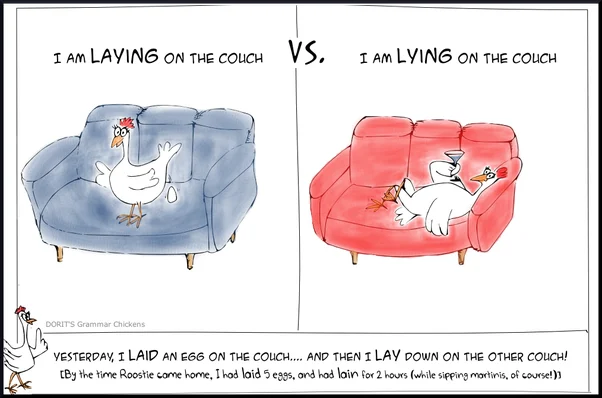
The terms “lie in bed” and “lie on bed” are frequently used interchangeably when referring to one’s position on a bed. The two expressions, however, have a little variation in connotation.
The phrase “Lie on the bed,” implies the action of lying on the bed with covers under you. While the phrase “Lie in bed,” refers to the action of lying on the bed with covers over you.
In this post, we shall discuss the subtleties of these expressions and when it is appropriate to use them.
Meaning Of “Lie in bed”
A frequent phrase indicating to relax, sleep, or spend time lying on the bed is “lie in bed.” This expression stresses lying on a bed, for rest or sleep.
Example: “I feel so exhausted today that I’m going to just lie in bed and read a book.”
In this sentence, the phrase “lie in bed” is used in the sense that the person will be lying down on the bed in a relaxed position, with no particular activity in mind other than reading a book.
Meaning of “Lie on the bed”
On the other hand, the phrase “lie on bed” suggests a more specific action of being in contact with the bed. The preposition “on” indicates that the person is resting on top of the bed, over the covers.
This phrase is commonly used when referring to the placement of objects on the bed.
Example: “I left my phone lying on the bed while I went to grab a glass of water.”
In this sentence, the phrase “lie on bed” refers to the location of the phone on top of the bed, rather than the position of a person on the bed.
Differences Between “Lie in bed” And “Lie on the bed”
For your convenience, the constructed table below highlights the differences between the use of both phrases.
| Basis of Comparison | “Lie in bed” | “Lie on the bed” |
|---|---|---|
| Meaning | To rest, sleep or spend time lying down on the bed, being under the covers. | To be in contact with the bed, over the covers. |
| Action | Lying inside the bed, under the covers for rest. | Person/object lying on the bed, temporarily over the covers. |
| Usage | Used to indicate an expression of being in a complete state of rest. | Used to indicate an expression of the temporary state of rest placement of an object. |
| Examples | “I feel so tired today, I think I’ll just lie in bed and read a book.” | “I left my phone lying on the bed while I went to grab a glass of water.” |
| Other phrases | Sit on the bed, lounge in the bed, and rest on the bed. | N/A |
When To Use “Lie in bed” And “Lie on the bed”
Now that we have a basic understanding of the difference between “lie in bed” and “lie on the bed,” let’s look at some scenarios where each phrase would be appropriate to use.
When to use “Lie in bed”
The phrase “lie in bed” is appropriate in the following scenarios:
- Sleeping or resting: When you want to convey that you are going to bed to sleep or rest, “lie in bed” is an appropriate phrase to use.
Example: “I had a long day at work, so I’m going to lie in bed and get some rest.”
- Relaxation: When you want to emphasize that you are taking a break and relaxing, “lie in bed” can be used to convey this message.
Example: “I’m going to turn off my phone and just lie in bed for a while to unwind.”
- Illness: When you are feeling unwell and want to stay in bed, “lie in bed” is a suitable phrase to use.
Example: “I have a terrible headache, so I’m going to lie in bed until it goes away.”

When to use “Lie on the bed”
The phrase “lie on bed” is appropriate in the following scenarios:
- Placement of objects: When you want to describe where an object is placed on the bed, “lie on bed” is the appropriate phrase to use.
Example: “I left my laptop lying on a bed while I went to get some food.”
- Adjusting position: When you want to indicate that you are moving or changing position on the bed, “lie on bed” can be used to describe the action.
Example: “I was lying on the bed reading a book when I decided to sit up and stretch my legs.”
- Relaxation: “Lie on the bed” can also be used to describe a specific position of relaxation, such as lying on your back on the bed.
Example: “I love to lie on the bed and listen my favorite songs when I’m feeling stressed.”
Other Phrases To Describe Being In/On The Bed
Although “lie in bed” and “lie on bed” are the most common phrases used, there are other variations that can be used depending on the context.
- Sit on the bed: This phrase is appropriate when you are sitting on the bed, rather than lying down.
Example: “I like to sit on the bed and put on my shoes before I leave the house.”
- Lounge on the bed: This phrase is used to describe a relaxed position on the bed, typically with pillows or cushions.
Example: “I spent the entire afternoon lounging on the bed, watching movies, and eating popcorn.”
- Rest on the bed: This phrase can be used to describe any act of being on the bed, either lying down or sitting up.
Example: “I like to rest in bed and listen to music before I go to sleep.”
FAQs (Frequently Asked Questions)
Do you lie in bed or lay in bed?
“Lie” is a verb that means to put yourself (on the bed) in a flat position, whereas “lay” is also a verb that means to put an object (on the bed) in a flat position so technically, you lie on the bed.
Can “lie in bed” and “lie on bed” be used interchangeably?
While “lie in bed” and “lie on bed” are often used interchangeably, there is a subtle difference in meaning between the two phrases.
It is important to choose the appropriate phrase depending on the context to avoid confusion.
If you are referring to resting, sleeping, or spending time in a horizontal position on the bed, then “lie in bed” is the more appropriate phrase. If you are referring to the placement of objects on the bed or changing positions, then “lie on the bed” is the more appropriate phrase.
Are there any other phrases that can be used to describe being on the bed?
Yes, there are several other phrases that can be used to describe being on the bed. For example, “sit on the bed” is appropriate when you are sitting on the bed, rather than lying down.
“Lounge on the bed” is used to describe a relaxed position on the bed, typically with pillows or cushions. “Rest on the bed” can be used to describe any act of being on the bed, including lying down or sitting up.
Why is it important to use the correct phrase when describing being on the bed?
Using the correct phrase is important to avoid confusion and to accurately convey your intended meaning. Using the wrong phrase can lead to misunderstandings or misinterpretations of your message.
It is important to choose the appropriate phrase based on the context of your message, such as whether you are referring to resting, sleeping, or changing position on the bed.
Additionally, using the correct phrase can also help you to communicate more effectively and clearly with others.
Conclusion
While “lie in bed” and “lie on bed” are often used interchangeably, there is a subtle difference in meaning between the two phrases.
The phrase “Lie on the bed,” implies the action of lying on the bed with covers under you. While the phrase “Lie in bed,” refers to the action of lying on the bed with covers over you.
It is important to choose the appropriate phrase depending on the context to avoid confusion. Additionally, there are other phrases that can be used to describe being on the bed, such as “sit on the bed,” “lounge on the bed,” and “rest on the bed.”

